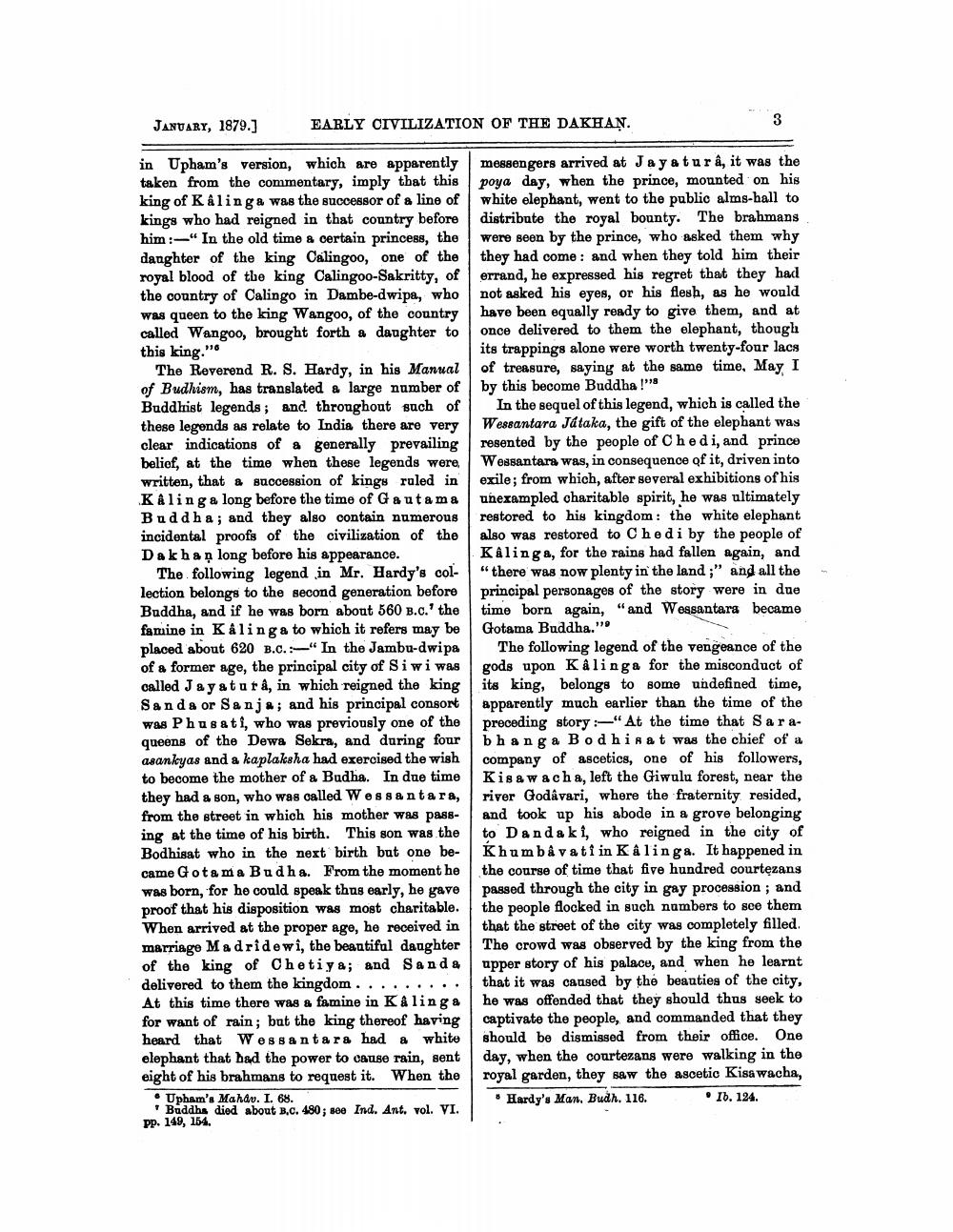Book Title: Indian Antiquary Vol 08 Author(s): Jas Burgess Publisher: Swati Publications View full book textPage 9
________________ EARLY CIVILIZATION OF THE DAKHAN. JANUARY, 1879.] in Upham's version, which are apparently taken from the commentary, imply that this king of Kalinga was the successor of a line of kings who had reigned in that country before him:-"In the old time a certain princess, the daughter of the king Calingoo, one of the royal blood of the king Calingoo-Sakritty, of the country of Calingo in Dambe-dwipa, who was queen to the king Wangoo, of the country called Wangoo, brought forth a daughter to this king." The Reverend R. S. Hardy, in his Manual of Budhism, has translated a large number of Buddhist legends; and throughout such of these legends as relate to India there are very clear indications of a generally prevailing belief, at the time when these legends were, written, that a succession of kings ruled in Kaling a long before the time of Gautama Buddha; and they also contain numerous incidental proofs of the civilization of the Dakhan long before his appearance. The following legend in Mr. Hardy's collection belongs to the second generation before Buddha, and if he was born about 560 B.C.' the famine in Kåling a to which it refers may be placed about 620 B.C." In the Jambu-dwipa of a former age, the principal city of Siwi was called Jay aturâ, in which reigned the king Sanda or Sanja; and his principal consort was Phusati, who was previously one of the queens of the Dewa Sekra, and during four asankyas and a kaplaksha had exercised the wish to become the mother of a Budha. In due time they had a son, who was called Wessantara, from the street in which his mother was passing at the time of his birth. This son was the Bodhisat who in the next birth but one became Gotama Budha. From the moment he was born, for he could speak thus early, he gave proof that his disposition was most charitable. When arrived at the proper age, he received in marriage Madridewi, the beautiful daughter of the king of Chetiya; and Sanda delivered to them the kingdom... At this time there was a famine in Kåling a for want of rain; but the king thereof having heard that Wessantara had a white elephant that had the power to cause rain, sent eight of his brahmans to request it. When the Upham's Mahav. I. 68. Buddha died about B.C. 480; see Ind. Ant. vol. VI. pp. 149, 154. 3 messengers arrived at Jaya turâ, it was the poya day, when the prince, mounted on his white elephant, went to the public alms-hall to distribute the royal bounty. The brahmans were seen by the prince, who asked them why they had come: and when they told him their errand, he expressed his regret that they had not asked his eyes, or his flesh, as he would have been equally ready to give them, and at once delivered to them the elephant, though its trappings alone were worth twenty-four lacs of treasure, saying at the same time, May I by this become Buddha!""" In the sequel of this legend, which is called the Wessantara Játaka, the gift of the elephant was resented by the people of Chedi, and prince Wessantara was, in consequence of it, driven into exile; from which, after several exhibitions of his unexampled charitable spirit, he was ultimately restored to his kingdom: the white elephant also was restored to Chedi by the people of Kalinga, for the rains had fallen again, and "there was now plenty in the land;" and all the principal personages of the story were in due time born again, "and Wessantara became Gotama Buddha." The following legend of the vengeance of the gods upon Kalinga for the misconduct of its king, belongs to some undefined time, apparently much earlier than the time of the preceding story:-"At the time that Sarabhanga Bodhisat was the chief of a company of ascetics, one of his followers, Kisawacha, left the Giwulu forest, near the river Godavari, where the fraternity resided, and took up his abode in a grove belonging to Dandaki, who reigned in the city of Khumbavati in Kalinga. It happened in the course of time that five hundred courtezans passed through the city in gay procession; and the people flocked in such numbers to see them that the street of the city was completely filled. The crowd was observed by the king from the upper story of his palace, and when he learnt that it was caused by the beauties of the city, he was offended that they should thus seek to captivate the people, and commanded that they should be dismissed from their office. One day, when the courtezans were walking in the royal garden, they saw the ascetic Kisawacha, Ib. 124. Hardy's Man. Budh. 116.Page Navigation
1 ... 7 8 9 10 11 12 13 14 15 16 17 18 19 20 21 22 23 24 25 26 27 28 29 30 31 32 33 34 35 36 37 38 39 40 41 42 43 44 45 46 47 48 49 50 51 52 53 54 55 56 57 58 59 60 61 62 63 64 65 66 67 68 69 70 71 72 73 74 75 76 77 78 79 80 81 82 83 84 85 86 87 88 89 90 91 92 ... 404
